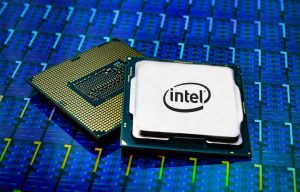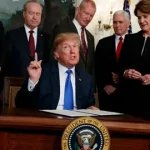Trump Urges Intel CEO to Resign Over China Investments
Intel CEO Lip-Bu Tan has come under fire from the Republican president for being “conflicted” because of his connections to Chinese tech companies.
President Donald Trump of the United States has issued a social media statement urging the CEO of the American technology company Intel to step down.
Amid concerns over the company’s leadership’s future, Trump’s move to criticise Intel CEO Lip-Bu Tan on Thursday morning sent the company’s stocks plunging.
Trump wrote, “INTEL’s CEO is extremely DISAGREABLE and needs to step down immediately.” “This problem can’t be solved in any other way. I appreciate you taking the time to look into this issue.
Trump’s statement seemed to be a reaction to claims that Tan had invested up to $200 million in Chinese semiconductor and technology manufacturing companies, some of which had ties to the nation’s military.
However, the president’s social media posts also raise questions about his seeming readiness to meddle in private company matters, even advocating for significant changes in direction and leadership.
Examining Tan’s connections to China Tan has been an investor in technology for a long time, although he is new to his position. In addition to serving on the board of directors, he was named CEO of Intel on March 12.

Tan previously held executive roles at Cadence Design Systems, a software company, and was a founding partner of Walden Catalyst Ventures, a venture financing firm.
On Wednesday, for instance, Republican Senator Tom Cotton of Arkansas posted a letter on social media written to the chairman of Intel’s board of directors, Frank Yeary.In it, he demanded more information about Tan’s hiring and his investments in China.
Cadence Design Systems pleaded guilty to federal charges on July 28 related to the sale of technology and intellectual property to China’s National University of Defence Technology, Cotton noted.
More than $140 million in criminal and civil penalties were imposed as a result of that plea agreement. In his letter to Yeary, Cotton stated, “I write to express concern about the security and integrity of Intel’s operations and its potential impact on US national security.”
According to reports, Mr. Tan owns stock in hundreds of Chinese chip and advanced manufacturing companies and controls dozens of Chinese businesses. According to reports, at least eight of these businesses are associated with the Chinese People’s Liberation Army.
Cotton went on to say that Intel “owes Congress an explanation” in a tweet to his social media followers. Tan and Intel have not yet addressed the issues. Trump promotes the “America First” agenda.
The US and China have been engaged in a fierce struggle for political and economic supremacy for many years, and the US has frequently charged China with trying to spy on its tech companies and steal American inventions. China, on the other hand, has refuted these claims, calling them a part of a smear effort by the US.
Intel, a leading US technology company founded in 1968, is well-known for manufacturing computer components such microprocessors. However, the business has found it difficult to stay up with its rivals in recent decades, especially as artificial intelligence (AI) has changed Silicon Valley, Intel’s long-time home.
But with his “America First” economic plan, which uses tariffs to deter foreign imports, Trump has aimed to support home industry. The Republican leader even declared on Tuesday that he would put 100 percent tariffs on foreign chips and semiconductors that are sold in the United States.
However, Trump has come under fire for pushing the limits of his executive authority and, in certain situations, attempting to dictate how private businesses are operated.
For example, Trump has withheld federal funds from private universities since he took office for a second term, demanding, among other things, that the universities end its diversity programs and institute disciplinary reforms.
Analysts seemed divided on whether Trump was overplaying his hand in a Reuters interview. According to David Wagner, head of equity and portfolio manager at Aptus Capital Advisors, which has invested in Intel, “many investors probably think that President Trump has his hand in too many cookie jars, it’s just another signal that he’s very serious about trying to bring business back to the US.”

The CEO of Ladenburg Thalmann Asset Management, Phil Blancato, told Reuters that Trump’s decision to fire Tan would have a negative impact on American business.
Blancato stated, “It would be creating a very bad precedent.” “Although you don’t want American presidents to dictate who runs businesses, his viewpoint is undoubtedly valid and significant.”
The impact of Trump’s pressure campaign against Tan on Intel’s future is uncertain. Under the 2022 CHIPS and Science Act, Intel was awarded $8 billion in subsidies last year to expand its chip production facilities in the United States.
SOURCE: AL JAZEERA AND NEWS AGENCIES











